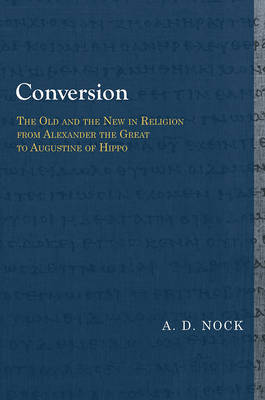
- Retrait gratuit dans votre magasin Club
- 7.000.000 titres dans notre catalogue
- Payer en toute sécurité
- Toujours un magasin près de chez vous
- Retrait gratuit dans votre magasin Club
- 7.000.0000 titres dans notre catalogue
- Payer en toute sécurité
- Toujours un magasin près de chez vous
76,45 €
+ 152 points
Description
Originally published in 1933, Conversion: The Old and the New in Religion from Alexander the Great to Augustine of Hippo remains one of the most influential studies of religion in the Hellenistic and Roman time periods. For years, Arthur Darby Nock was one of the world's leading authorities on the religions of later antiquity. In this book, Nock analyzes the religious environment in the Greco-Roman world to reveal what made Judaism and Christianity distinctive.
Nock compares the conversion process of Christianity with other religious options of the time, noting the differences. He traces the connections between Christianity and the culture into which it was born--a culture in which Christian beliefs and practices spread within households and along already established paths of trade to bridge social divides, offering a compelling alternative to traditional and contemporary cultic options. Through a deep examination of the psychology and circumstances of the Greco-Roman period, Nock concludes that Christianity succeeded, in part, because it acquired and adapted various aspects of other religions and philosophies that possessed popular appeal. Now with a new introduction by Clare K. Rothschild (Lewis University), this new edition of Conversion revitalizes a work that continues to speak. Conversion is still an essential read for anyone attempting to understand the complex relationships among religion, culture, and the rise of Christianity.Spécifications
Parties prenantes
- Auteur(s) :
- Editeur:
Contenu
- Nombre de pages :
- 345
- Langue:
- Anglais
- Collection :
Caractéristiques
- EAN:
- 9781481311588
- Date de parution :
- 01-07-19
- Format:
- Livre broché
- Format numérique:
- Trade paperback (VS)
- Dimensions :
- 152 mm x 229 mm
- Poids :
- 508 g

Les avis
Nous publions uniquement les avis qui respectent les conditions requises. Consultez nos conditions pour les avis.






